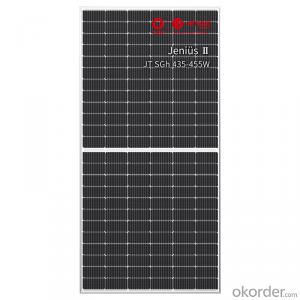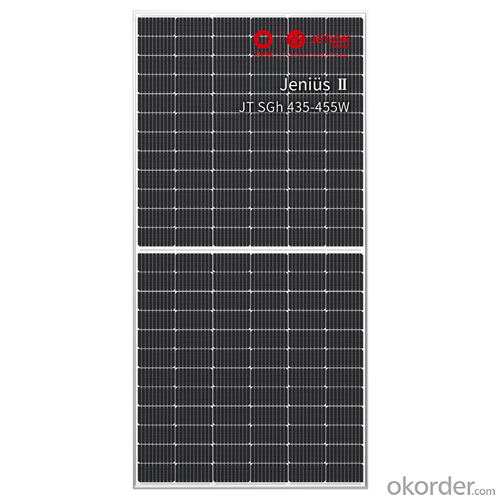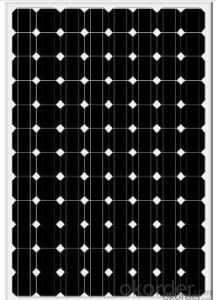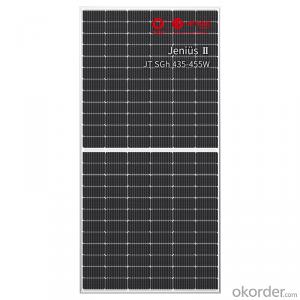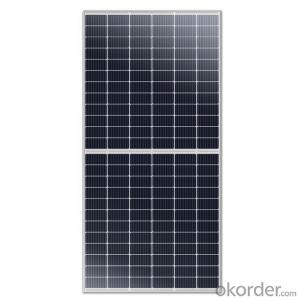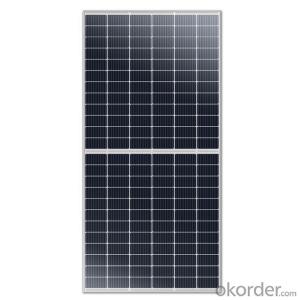Solar Panels Boca Raton - Tier1 Jetion Brand 144 Cells Mono PERC 1500V DC 21.5% Maximum Efficiency 380W Solar Panel
- Supplier:
 Jetion Holdings Limited
Jetion Holdings Limited
- Loading Port:
- China main port
- Payment Terms:
- TT OR LC
- Min Order Qty:
- 806 pc
- Supply Capability:
- 500000 pc/month
OKorder Service Pledge
Quality Product, Order Online Tracking, Timely Delivery
OKorder Financial Service
Credit Rating, Credit Services, Credit Purchasing
You Might Also Like
As a member of CNBM - a Fortune 500 company, Jetion Solar provides various product solutions, global EPC service and nancing. Its standard and high-e ciency product o erings are among the most powerful and cost-e ective in the industry. Till now, Jetion Solar has cumulatively more than 10 GW module shipment and 1 GW global EPC track records.
Structural characteristics
| Component size | 1755x1038x35mm |
| Weight | 20 kg |
| Battery | Mono 182 mm (2 x78pcs) |
| Glass | Coated, 3.2mm toughened glass, low iron |
| Frame | Anodized aluminium alloy |
| Junction box | IP68 |
| Output wire | 4.0mm², wire length: 1200mm for positive and negative poles |
| Connector | MC4 compatible |
| Mechanical load | Front maximum: 5400Pa;Back maximum: 2400Pa |

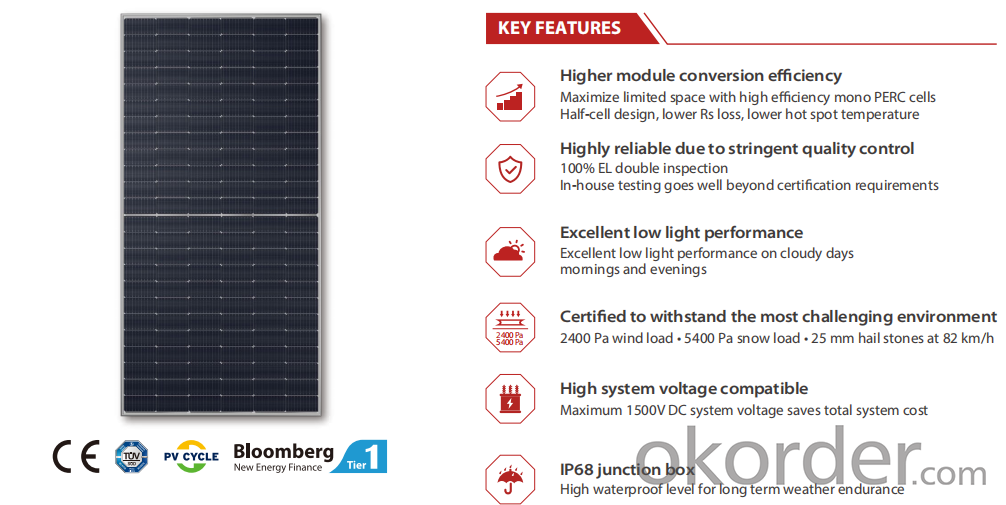
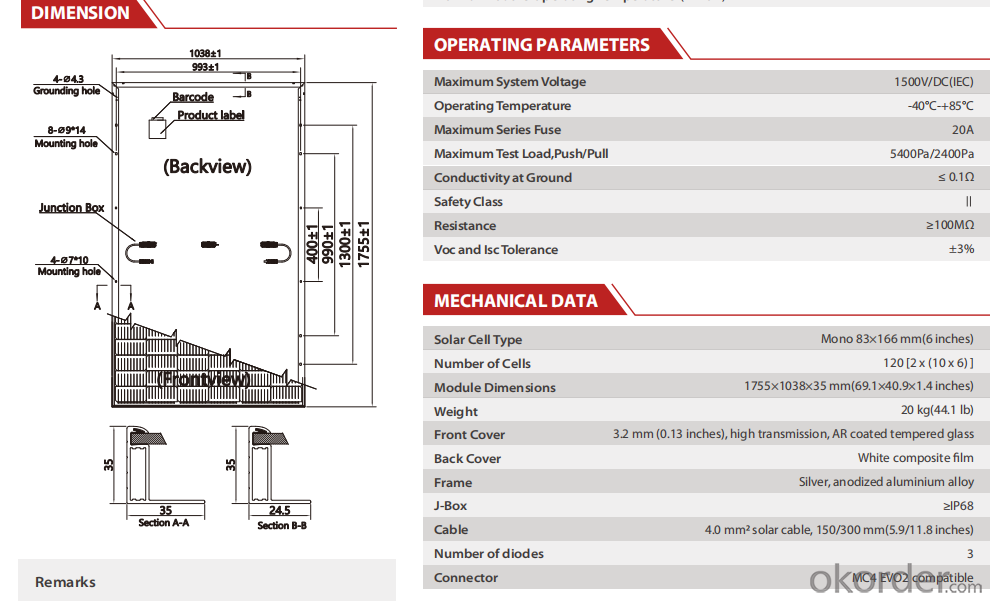
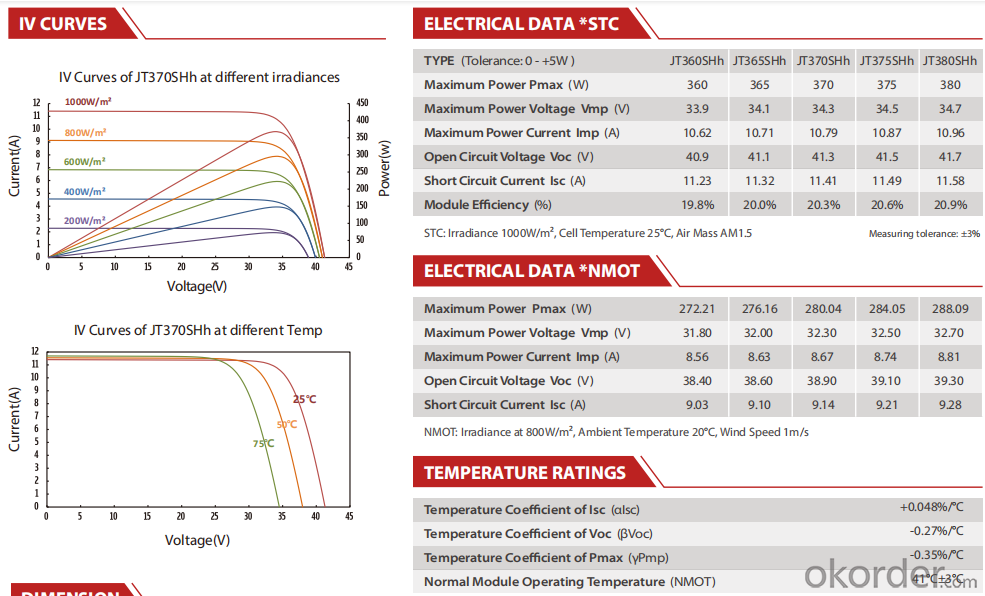
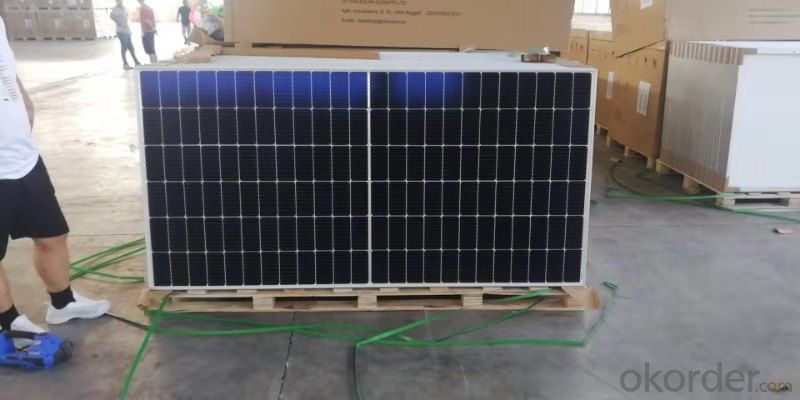
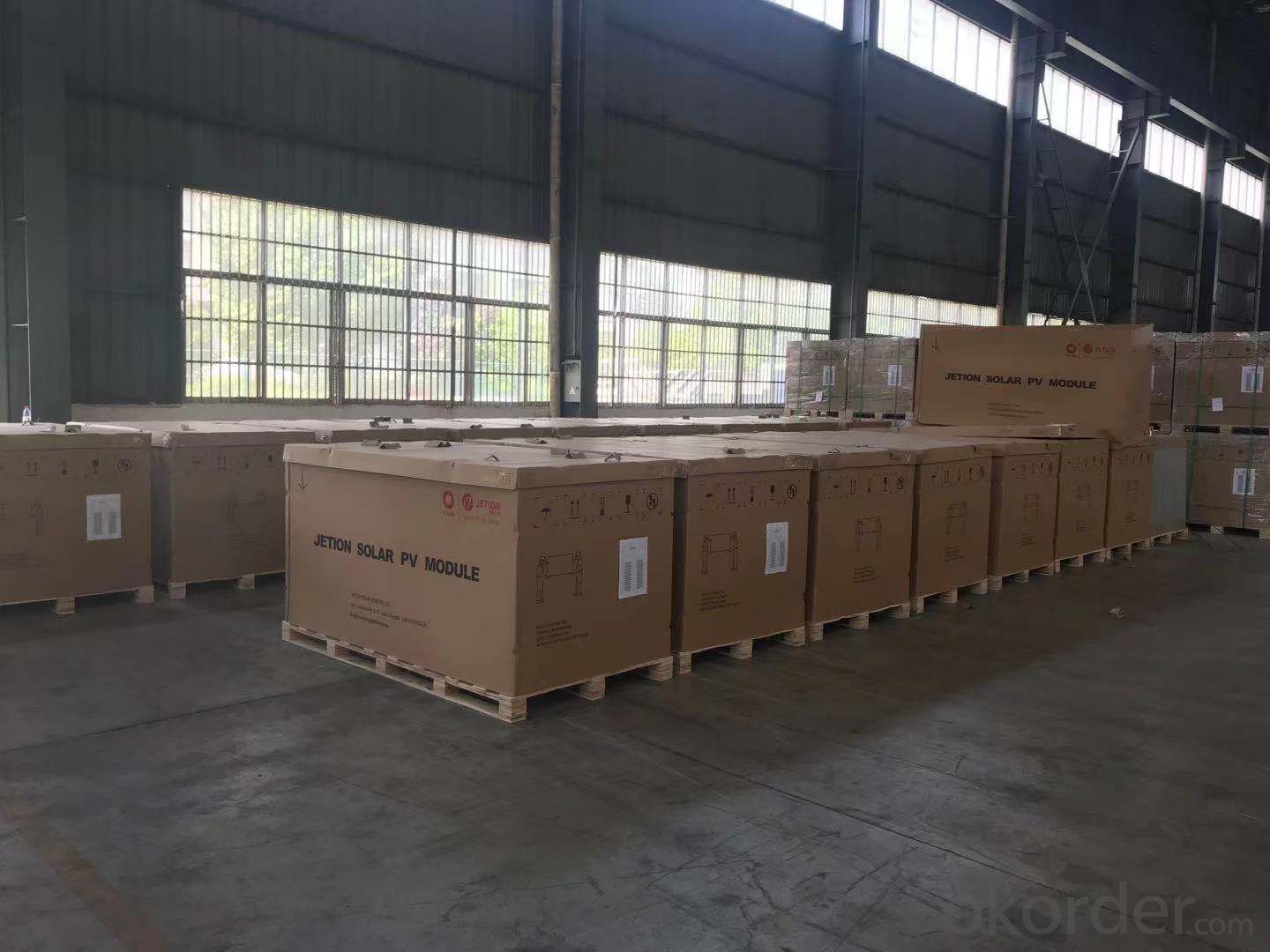
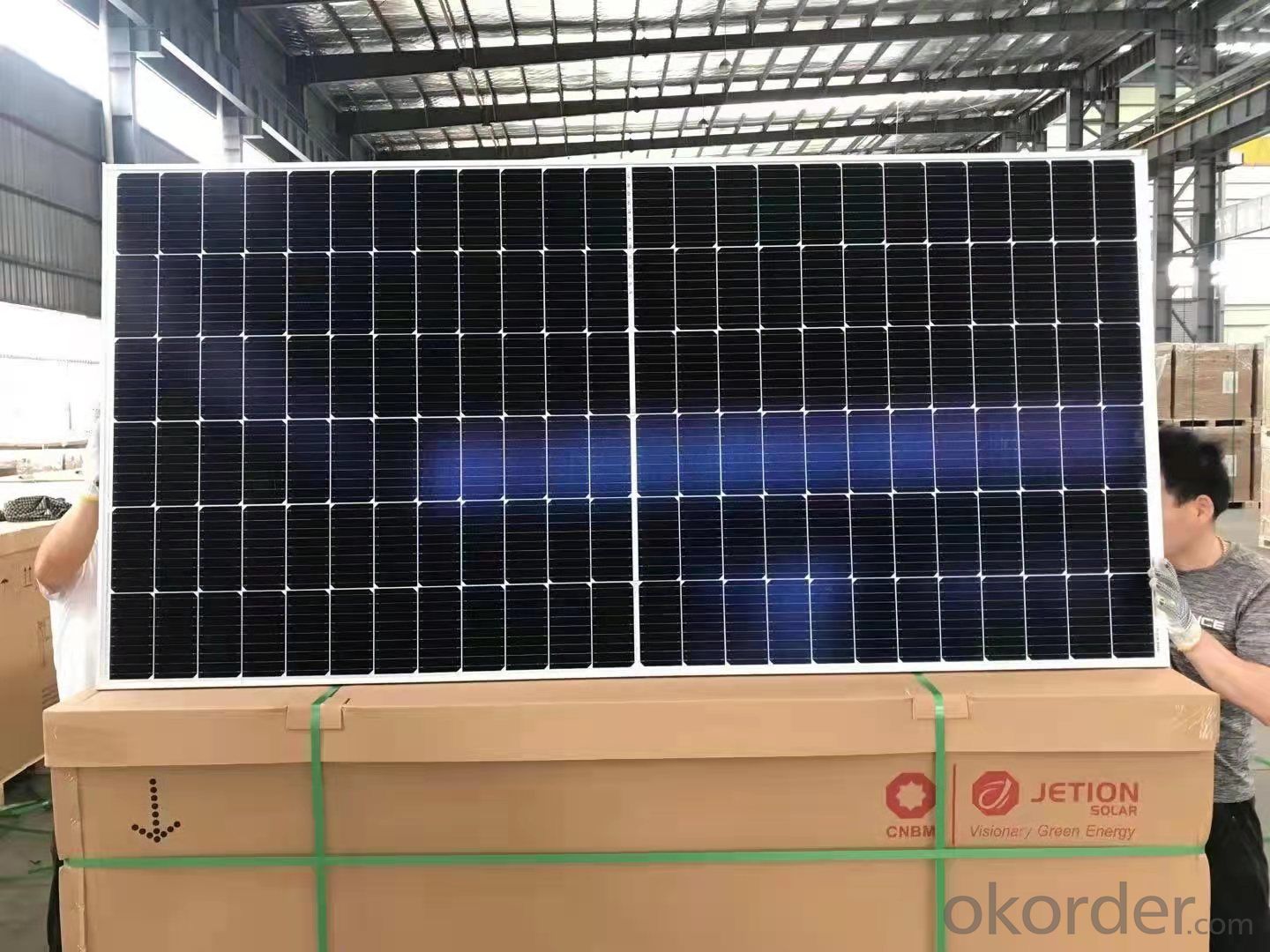
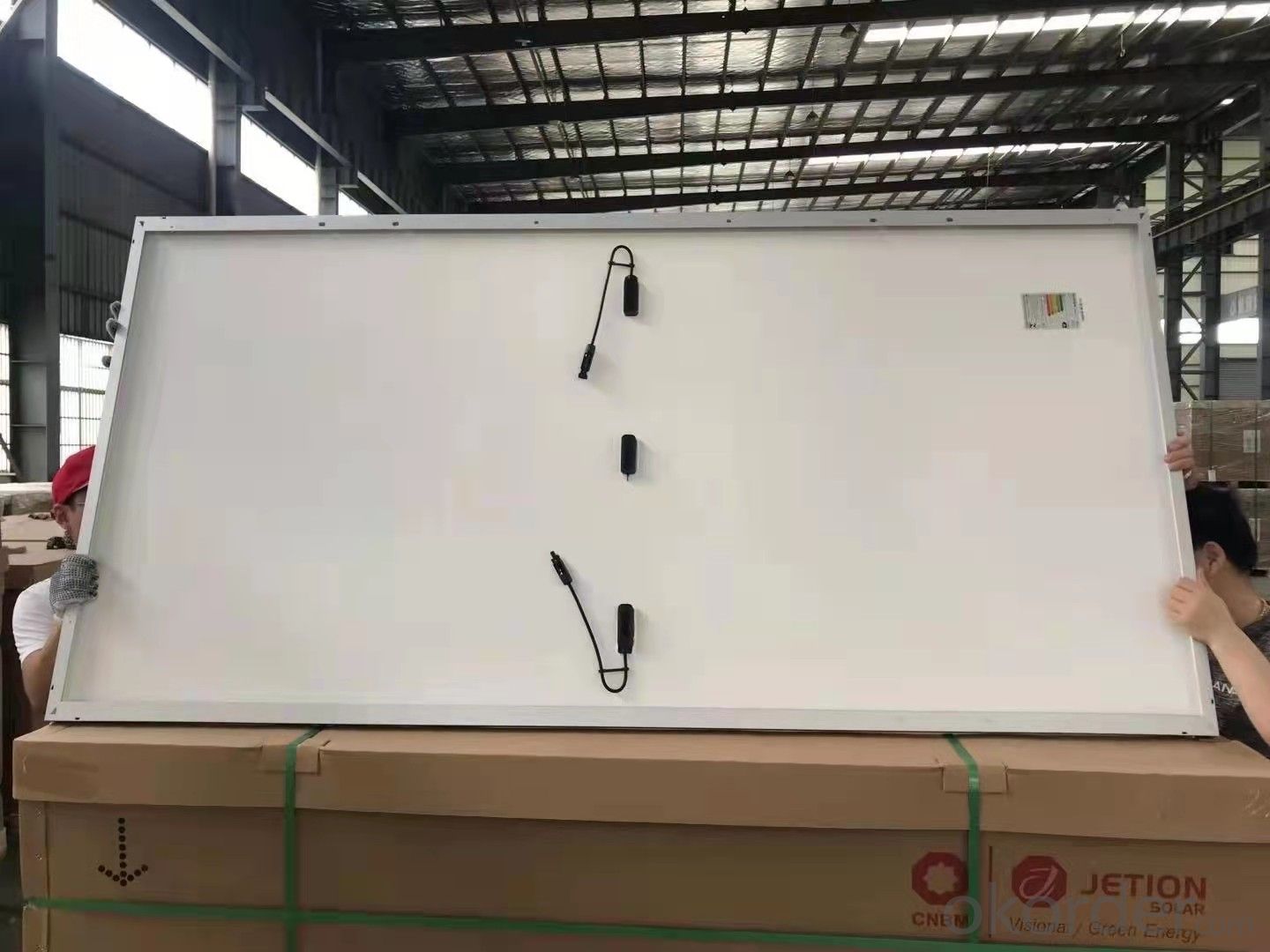
- Q: I'm about to buy one but I don't really know which one is best for my home.
- One will give you enough DC voltage to light a 25 watt light bulb, [ one 45 watt panel is around $400. ] Now if your wanting AC voltage You have to buy a inverter, 5 or 6 deep cycle batteries, a switch Cables to transfer the voltage, a place out side to store the batteries, instalation brackets for the roof A Permit to Install them
- Q: Are there any limitations to the lifespan of solar panels?
- Yes, there are limitations to the lifespan of solar panels. While solar panels are designed to be durable and long-lasting, they do have a finite lifespan. The average lifespan of solar panels is typically around 25-30 years. However, environmental factors, such as extreme weather conditions, can affect their performance and longevity. Over time, solar panels may experience degradation, reducing their efficiency and power output. Additionally, technological advancements may render older solar panel models outdated or less efficient. Despite these limitations, proper maintenance and regular cleaning can help extend the lifespan of solar panels.
- Q: Hello from SO TX.. I would like to know if anyone out there has SOLAR PANELS on their home?I have a 850 sq ft. house. I called Austin to a company that offers panels and installation. The cost $8,000.00, for 0 panels . The rep said we would save about 2 to 25% on our electric bill /mo. We use approximately 980 kw/mo. Our bill is around $40.00 / mo...I really don't think that's a good enough savings. We figure it would take 25 years to recoup our investment.And where we live in TX it does not offer any incentives. The gov. allows you a $2000.00 tx break.
- How Solar Cells Work by Scott Aldous Inside This Article . Introduction to How Solar Cells Work 2. Photovoltaic Cells: Converting Photons to Electrons 3. How Silicon Makes a Solar Cell 4. Anatomy of a Solar Cell 5. Energy Loss in a Solar Cell 6. Solar-powering a House 7. Solving Solar-power Issues 8. Solar-power Pros and Cons 9. Lots More Information 0. See all Physical Science articles You've probably seen calculators that have solar cells -- calculators that never need batteries, and in some cases don't even have an off button. As long as you have enough light, they seem to work forever. You may have seen larger solar panels -- on emergency road signs or call boxes, on buoys, even in parking lots to power lights. Although these larger panels aren't as common as solar powered calculators, they're out there, and not that hard to spot if you know where to look. There are solar cell arrays on satellites, where they are used to power the electrical systems. You have probably also been hearing about the solar revolution for the last 20 years -- the idea that one day we will all use free electricity from the sun. This is a seductive promise: On a bright, sunny day, the sun shines approximately ,000 watts of energy per square meter of the planet's surface, and if we could collect all of that energy we could easily power our homes and offices for free.
- Q: I found portable solar panels used for boats etc. and was wondering how I could effectly use them for my home instead. If you have used them in the past, please tell how they worked (good or bad).
- Most people think all one needs is some solar panels to make power. It doesn't usually work that way. On a boat it is easy because most boats use batteries and DC power. If all you want to do is make DC power, you will need a battery to hook your portable unit / units to. You can then use the battery to supply power to something that uses battery power. You may need a voltage converter if the device is not 2 volt. To use the power you get from solar panels for AC power like your house has, you need a regulator, inverter, and controller to change the DC output from the panel (s) to AC and then control the power into your electric system. You also need a unit from your electric company installed. A decent minimal solar system for an average house may cost around $5000 - $0,000. It will take many, many years to pay back. For a full-use system with generator, it will probably take $30,000 - $40,000 IF you don't use it for air conditioning. If you live in an area where you have a lot of cloudy days, it will take many, many, many, many years to pay back. The reason everyone isn't using solar power is because it is not cheap and has not been cost-effective for most situations. Most Americans would not like it's inconvenience at times. It is not new science. It is in use many places and well known. It is great for some applications and as fuel and electrical power cost increase it will be used more. Don't believe the media and hollywood. They are not interested in truth. They are just interested in making you believe their way. Study and learn.
- Q: quot;Does it take more energy to produce a solar panel than what the same solar panel can generate in its useful lifetime?quot;
- No. okorder /... Since then they have only improved. CdTe efficiencies have increased, partly by reducing material use (particularly the depth of the CdS layer)
- Q: Hoping to find instruction, materials list and hardware needed to construct solar panels myself, how many and make it happen instead of talking about it
- Silica based solar cells are not the kind of thing you whomp up in you basement. Here are a couple ideas for solar systems you can build and install yourself. Take a 4 x 8 sheet of /2 inch plywood. Frame sides with 2 x 4's. Screw tin cans in a staggered row (checker board) pattern inside frame. The more cans the more heat you get so place them nearly touching. Paint cans and entire assembly flat black. Cover top with glass, plexiglass (best) or heavy mill clear plastic (cheapest)Place on roof. Drill 3-4 inch holes in opposing sides. Run pipe or tubing into house. Attach to small low speed fan. The black paint will absorb sunlight and heat. The air moving through box will carry heat into house. It's a cheap efficient way to help heat your home. You can vary size and shape of box to fit your roof. If you use more than one box, hook them up in series. More boxes mean more surface area means more heat. To heat water. Take a steel tank. A car gas tank works well. It is galvanized so it won't rust, is cheap, and easily available at any auto salvage yard. But you will have to flush in throughly to remove gasoline odor. A steel 55 gallon drum is easier to work with but may cost more. Paint exterior of tank flat black. Weld/glue/clamp water pipes to tank. Place on ground in area that gets lots of sunlight. Attach water supply to tank and route discharge pipe to house or appliance. Black painted steel absorbs heat from sun light and heats water. In spring and fall you get warm to hot water. In summer you get scalding hot water and in winter you get cold to luke warm water. Both of these solar powered systems are seasonal and their output varies according to location and climate, but they are very inexpensive and easy to build and provide FREE heat and/or hot water for many years with little or no maintainence.
- Q: Can solar panels be used in areas with high levels of dust?
- Yes, solar panels can still be used in areas with high levels of dust. While excessive dust can reduce the efficiency of solar panels by blocking sunlight, regular cleaning and maintenance can help mitigate this issue. Additionally, advancements in technology, such as self-cleaning panels or coatings that repel dust, are being developed to further enhance the performance of solar panels in dusty environments.
- Q: Can solar panels be installed on a deck or patio?
- Yes, solar panels can be installed on a deck or patio. In fact, many homeowners choose to install solar panels on their outdoor spaces to maximize sunlight exposure and take advantage of the available space. However, it is important to consider the structural integrity of the deck or patio and ensure that it can support the weight of the solar panels. Additionally, local regulations and permits may be required before installation.
- Q: Can anyone give me a simple but informative explanation on how solar panels produce electricity/power? Thank you!
- The sun produces energy. When that sunlight hits most surfaces, it causes that surface to heat up. When the sunlight hits some other surfaces, instead of heat, the result reaction is electricity charges. Some of those surfaces are certain types of silicon, which is what solar panels are made of. The electricity produced is DC electricity. It is then funneled to charge a battery, where it can be stored. If need be, it is passed through a inverter, which changes it to the AC power that we use for our appliances.
- Q: Interested to know if it is possible to install Solar Panels to run my Jacuzzi?Don't want to do the whole house just the jacuzzi anybody have any ideas Thanks
- You can do this by isolating the jacuzzi, you will need a solar array adequate for the power draw of the jacuzzi, a charge controller, battery bank, off-grid inverter and switch gear. This is the expensive way to go--especially if you are planning to heat the water with the solar. A better option would be to heat the jacuzzi with solar thermal panels. It is plumbing instead of electrical, but the cost would be much less. If you still want to do PV (electric) solar, think about putting a non-isolated grid-tie solar array on your home. They are much cheaper, and if you think about it, it really does not matter if you use the solar electricity to run a light, a fridge, a TV, or a Jacuzzi, that amount of power is subtracted from your overall house power bill. Just size the array for the power output of the jacuzzi, and let the power meter do the rest. Your overall result will be the same and the system will be half the price, or less.
Send your message to us
Solar Panels Boca Raton - Tier1 Jetion Brand 144 Cells Mono PERC 1500V DC 21.5% Maximum Efficiency 380W Solar Panel
- Supplier:
 Jetion Holdings Limited
Jetion Holdings Limited
- Loading Port:
- China main port
- Payment Terms:
- TT OR LC
- Min Order Qty:
- 806 pc
- Supply Capability:
- 500000 pc/month
OKorder Service Pledge
Quality Product, Order Online Tracking, Timely Delivery
OKorder Financial Service
Credit Rating, Credit Services, Credit Purchasing
Similar products
Hot products
Hot Searches
Related keywords
